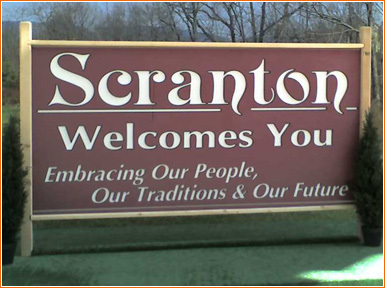Hard-up for cash to meet growing employee costs and swelling debt payments, the city of Scranton, Pennsylvania, is hungrily eyeing the paychecks of workers who don’t live in the city.
If a three-judge panel in Lackawanna County Court gives its consent, Scranton will move ahead with a plan to tax the income of individuals who work in the city but live beyond its borders.
Alexander Chelik says the whole thing reminds him of that famous phrase from the American Revolution.
‘Taxation Without Representation’
“One of the principles that our country was founded upon was no taxation without representation,” said Chelik, the longtime mayor of Mayfield, a borough of 1,800 residents located about 15 miles north of Scranton.
Chelik is leading the opposition to the proposed tax, which he says is little more than a cash grab by a city that has eaten through its own revenue and is now scavenging for more tax dollars by going after commuters.
“[Commuters] have no say in the running of the city government, and now the city wants to impose a tax on them to bail them out,” he said.
Scranton is operating under the state’s program for fiscally distressed municipalities, known as Act 47, and state officials agreed to include the new tax in a recovery plan for the city that was approved last August. The city also must win approval from Lackawanna County Court, where it will argue the commuter tax is necessary because all existing tax revenue has been tapped out.
The 1 percent earned-income tax on people who work in the city but live elsewhere is expected to generate about $2.5 million in 2013 and $4 million in 2014 and 2015. The city will have to go before the court each year to get permission to impose the tax.
The earned-income tax on city residents will remain unchanged at 3.4 percent in the proposed 2013 budget. The city’s real estate taxes are set to increase by 12 percent.
Strong Business Opposition
A survey of more than 700 businesses conducted by the Greater Scranton Chamber of Commerce found 84 percent opposed the new tax.
“The imposition of the commuter tax will make it more difficult to recruit employees and more expensive to keep them,” Austin Burke, president of the chamber, said in a letter sent last month to Scranton Mayor Chris Doherty.
Doherty did not return calls for comment, though he told the Scranton Times-Tribune “we’ve raised taxes everywhere” and defended the commuter levy as a “temporary tax.”
Scranton’s proposed budget for 2013 is $109 million, up from $85 million this year. The increase is mostly the result of a $17 million court-ordered arbitration settlement with the city’s police and fire unions and a $4 million increase in contributions to the city’s pension fund.
The city is more than $300 million in debt, including a $113-million unfunded pension liability.
Eric Boehm ([email protected]) writes for the Pennsylvania Independent, where a version of this article first appeared. Used with permission.




